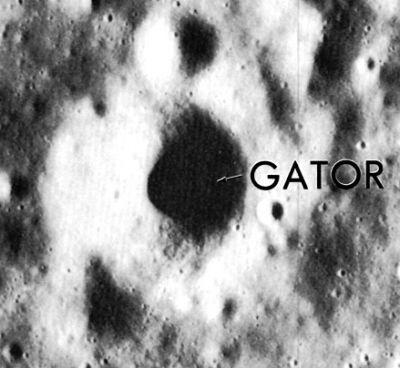Difference between revisions of "Gator"
(Created page with "<div id="content_view" class="wiki" style="display: block"> =Gator (Apollo 16 site craterlet name)= {| class="wiki_table" | Lat: 9.0°S, Long: 15.6°E, Diam: 1 km, Depth:...") |
|||
| Line 3: | Line 3: | ||
{| class="wiki_table" | {| class="wiki_table" | ||
| | | | ||
| − | Lat: 9.0°S, Long: 15.6°E, Diam: 1 km, Depth: km, [ | + | Lat: 9.0°S, Long: 15.6°E, Diam: 1 km, Depth: km, [[R%C3%BCkl%2045|Rükl: 45]]<br /> |
|} | |} | ||
<div id="toc"> | <div id="toc"> | ||
| Line 11: | Line 11: | ||
[http://www.lpod.org/coppermine/thumbnails.php?album=search&type=full&search=Gator LPOD Photo Gallery] [http://www.lpi.usra.edu/resources/lunar_orbiter/bin/srch_nam.shtml?Gator%7C0 Lunar Orbiter Images] [http://www.lpi.usra.edu/resources/apollo/search/feature/?feature=Gator Apollo Images]<br /> <br /> | [http://www.lpod.org/coppermine/thumbnails.php?album=search&type=full&search=Gator LPOD Photo Gallery] [http://www.lpi.usra.edu/resources/lunar_orbiter/bin/srch_nam.shtml?Gator%7C0 Lunar Orbiter Images] [http://www.lpi.usra.edu/resources/apollo/search/feature/?feature=Gator Apollo Images]<br /> <br /> | ||
==Maps== | ==Maps== | ||
| − | ''([ | + | ''([[LAC%20zone|LAC zone]] 78D2)'' [http://www.lpi.usra.edu/resources/mapcatalog/LAC/lac78/ LAC map] [http://www.lpi.usra.edu/resources/mapcatalog/usgs/I546/ Geologic map] [http://www.lpi.usra.edu/resources/mapcatalog/LM/lm78/ LM map] [http://www.lpi.usra.edu/resources/mapcatalog/LTO/lto78d2_1/ LTO map] [http://www.lpi.usra.edu/resources/mapcatalog/topophoto/78D2S1/ Topophotomap]<br /> <br /> |
==Description== | ==Description== | ||
| − | The [ | + | The [[Landing%20Site%20Name|Landing Site Name]] "Gator" is plotted on [http://www.lpi.usra.edu/resources/mapcatalog/LPST/78d2s2/ Site Traverses chart 78D2/S2] .<br /> <br /> |
==Description: Wikipedia== | ==Description: Wikipedia== | ||
No Wikipedia page for '''Gator''', see page of its west-northwestern neighbor''':''' [https://en.wikipedia.org/wiki/Palmetto_(crater) Palmetto]<br /> <br /> | No Wikipedia page for '''Gator''', see page of its west-northwestern neighbor''':''' [https://en.wikipedia.org/wiki/Palmetto_(crater) Palmetto]<br /> <br /> | ||
| Line 19: | Line 19: | ||
- It is perhaps possible to observe '''Gator''' through very powerful telescopes, or to make digital webcam photographs of it (also through powerful telescopes). '''Gator''' has the same diameter as its neighbour '''North Ray Crater''' to the north-northwest, and should be observed during the hours when there's enough shadow on its inner slopes (as seen in the orbital photograph above). The albedo of '''Gator''' is rather low, and because of this it is not observable during Full Moon. Both '''North Ray Crater''' and '''South Ray Crater''' on the other hand are very easy observer's targets just before, during, and after Full Moon! <span class="membersnap">- [http://www.wikispaces.com/user/view/DannyCaes [[Image:DannyCaes-lg.jpg|16px|DannyCaes]]] [http://www.wikispaces.com/user/view/DannyCaes DannyCaes] <small>Apr 25, 2010</small></span><br /> <br /> | - It is perhaps possible to observe '''Gator''' through very powerful telescopes, or to make digital webcam photographs of it (also through powerful telescopes). '''Gator''' has the same diameter as its neighbour '''North Ray Crater''' to the north-northwest, and should be observed during the hours when there's enough shadow on its inner slopes (as seen in the orbital photograph above). The albedo of '''Gator''' is rather low, and because of this it is not observable during Full Moon. Both '''North Ray Crater''' and '''South Ray Crater''' on the other hand are very easy observer's targets just before, during, and after Full Moon! <span class="membersnap">- [http://www.wikispaces.com/user/view/DannyCaes [[Image:DannyCaes-lg.jpg|16px|DannyCaes]]] [http://www.wikispaces.com/user/view/DannyCaes DannyCaes] <small>Apr 25, 2010</small></span><br /> <br /> | ||
==Nomenclature== | ==Nomenclature== | ||
| − | Astronaut-named feature, [ | + | Astronaut-named feature, [[Apollo%2016%20site|Apollo 16 site]].<br /> The small bowl-shaped crater immediately east of '''Gator''' was unofficially called '''''Lone Star''''' (see page 222 in David M. Harland's ''Exploring the Moon; the Apollo expeditions'')(Springer, 1999).<br /> <br /> |
==LPOD Articles== | ==LPOD Articles== | ||
<br /> | <br /> | ||
Revision as of 14:49, 15 April 2018
Contents
Gator (Apollo 16 site craterlet name)
|
Lat: 9.0°S, Long: 15.6°E, Diam: 1 km, Depth: km, Rükl: 45 |
Table of Contents
[#Gator (Apollo 16 site craterlet name) Gator (Apollo 16 site craterlet name)]
[#Gator (Apollo 16 site craterlet name)-Images Images]
[#Gator (Apollo 16 site craterlet name)-Maps Maps]
[#Gator (Apollo 16 site craterlet name)-Description Description]
[#Gator (Apollo 16 site craterlet name)-Description: Wikipedia Description: Wikipedia]
[#Gator (Apollo 16 site craterlet name)-Additional Information Additional Information]
[#Gator (Apollo 16 site craterlet name)-Nomenclature Nomenclature]
[#Gator (Apollo 16 site craterlet name)-LPOD Articles LPOD Articles]
[#Gator (Apollo 16 site craterlet name)-Bibliography Bibliography]

Apollo 16 Site Traverses Chart
Images
LPOD Photo Gallery Lunar Orbiter Images Apollo Images
Maps
(LAC zone 78D2) LAC map Geologic map LM map LTO map Topophotomap
Description
The Landing Site Name "Gator" is plotted on Site Traverses chart 78D2/S2 .
Description: Wikipedia
No Wikipedia page for Gator, see page of its west-northwestern neighbor: Palmetto
Additional Information
- It is perhaps possible to observe Gator through very powerful telescopes, or to make digital webcam photographs of it (also through powerful telescopes). Gator has the same diameter as its neighbour North Ray Crater to the north-northwest, and should be observed during the hours when there's enough shadow on its inner slopes (as seen in the orbital photograph above). The albedo of Gator is rather low, and because of this it is not observable during Full Moon. Both North Ray Crater and South Ray Crater on the other hand are very easy observer's targets just before, during, and after Full Moon! - DannyCaes DannyCaes Apr 25, 2010
Nomenclature
Astronaut-named feature, Apollo 16 site.
The small bowl-shaped crater immediately east of Gator was unofficially called Lone Star (see page 222 in David M. Harland's Exploring the Moon; the Apollo expeditions)(Springer, 1999).
LPOD Articles
Bibliography
David M. Harland: EXPLORING THE MOON, the Apollo expeditions.
Eric M. Jones: APOLLO LUNAR SURFACE JOURNAL (ALSJ).
This page has been edited 1 times. The last modification was made by - tychocrater tychocrater on Jun 13, 2009 3:24 pm - afx3u2